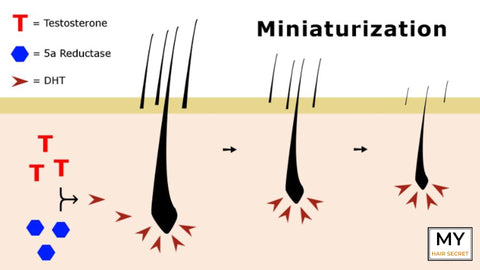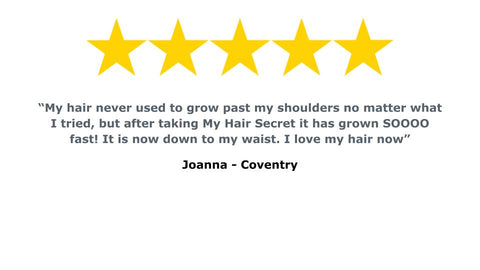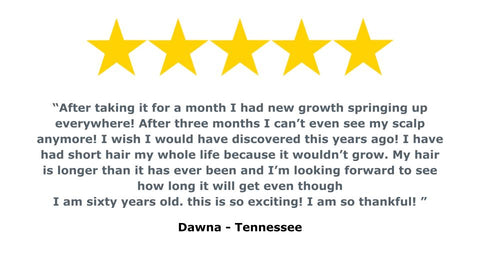Menopause is a transformative phase in a woman's life, marked by hormonal changes that can lead to a variety of physical and emotional shifts. One of the lesser-known effects of menopause is its impact on hair health. Hormonal fluctuations, particularly changes in dihydrotestosterone (DHT) levels, play a crucial role in hair loss during this stage. However, with the right knowledge and strategies, women can mitigate the effects of menopausal hair loss by harnessing the power of nutrients like biotin, zinc, copper, vitamin D, selenium and the DHT inhibiting LUSTALOX blend.
Menopause, Dihydrotestosterone, and Hair Loss
Menopause is a biological transition that typically occurs between the ages of 45 and 55, signaling the cessation of a woman's menstrual cycle and a decline in reproductive hormones. Some women could start to see negative effects on hair health during Premenopause or Perimenopause from around 30 - 45 years old. One significant hormonal change during menopause and perimenopause is the decrease in estrogen levels, which can lead to a relative increase in androgen like testosterone. This hormonal shift can impact hair follicles in a way that makes them more sensitive to the effects of DHT.

Dihydrotestosterone, often referred to as DHT, is a potent androgen hormone derived from testosterone through the action of the enzyme 5-alpha reductase. While essential for the development of male secondary sexual characteristics during puberty, DHT can become problematic when its levels are elevated. In men, high levels of DHT are associated with male pattern baldness. In women, the gradual increase in androgens, including DHT, during menopause can lead to the thinning of hair and a reduction in hair density.

How Dihydrotestosterone Affects Hair Growth
DHT's impact on hair growth is primarily felt through its interaction with hair follicles. Hair follicles contain androgen receptors, which are like locks that DHT can bind to. When DHT binds to these receptors, it can cause a process known as follicular miniaturization. This process leads to a gradual shrinking of hair follicles over time, resulting in finer and shorter hair strands. As the miniaturization continues, hair growth becomes increasingly compromised, leading to noticeable hair thinning and, in some cases, hair loss.
Nutrients to the Rescue: Biotin, Zinc, Copper, Vitamin D, Selenium and LUSTALOX
- Biotin: Biotin, also known as vitamin B7, is a vital nutrient for maintaining healthy hair, skin, and nails. It plays a crucial role in keratin production, a protein that forms the structure of hair. Biotin supplementation can strengthen hair and promote growth, potentially offsetting the effects of hair thinning.
- Zinc: Zinc is essential for numerous bodily functions, including maintaining healthy hair follicles. It regulates cell turnover, which supports hair growth and repair. A deficiency in zinc can lead to hair loss, making its inclusion crucial for menopausal women.
- Copper: Copper aids in the production of melanin, the pigment responsible for hair color. Maintaining optimal copper levels can help prevent premature graying and support vibrant hair appearance.
- Vitamin D: Vitamin D is not only important for bone health but also for hair follicle cycling. It influences the hair growth cycle and promotes the growth of new hair follicles.
- Selenium: Selenium is an antioxidant that helps protect cells, including those in hair follicles, from oxidative stress. Additionally, selenium supports thyroid function, indirectly impacting hair health by regulating hormone balance.
- LUSTALOX: LUSTALOX blend contains nutrients reported to protect the hair follicle from DHT hormone damage. Lustalox also contains beneficial Antioxidants, Flavonoids, Linoleic acid, Sterols, Vitamin E and OPCs (oligomeric proanthocyanidins). The last two constituents have been reported to stop hair loss and promote hair regrowth
Hair Boost Supplements by “My Hair Secret” are the ONLY supplements in the WORLD containing LUSTALOX
Menopause brings about a cascade of hormonal changes, and hair loss can be an unexpected and distressing side effect for many women. Understanding the role of dihydrotestosterone and its interaction with hair follicles sheds light on the mechanisms behind menopausal hair loss. By embracing a diet rich in biotin, zinc, copper, vitamin D, and selenium, women can take proactive steps to counteract hair thinning and promote healthier hair growth during this transition. Incorporating these nutrients, either through dietary choices or supplements, can contribute to both enhanced hair aesthetics and overall well-being during menopause.
Why not try our HAIR BOOST supplements - The ONLY supplement in the WORLD containing DHT busting "LUSTALOX" along with Biotin 10,000mcg - Magnesium 25mg - Zinc 15mg - Selenium 150mcg - Copper 1000mcg - Vitamin D 4000iu
ALL IN ONE CAPSULE PER DAY!


Always consult with a healthcare professional before making significant changes to your diet or supplement regimen to ensure safety and efficacy.


